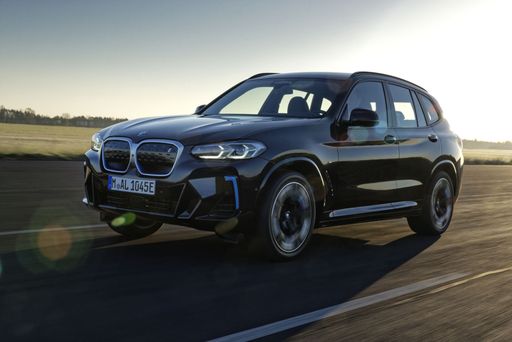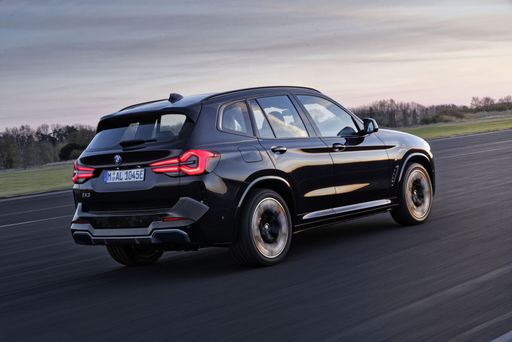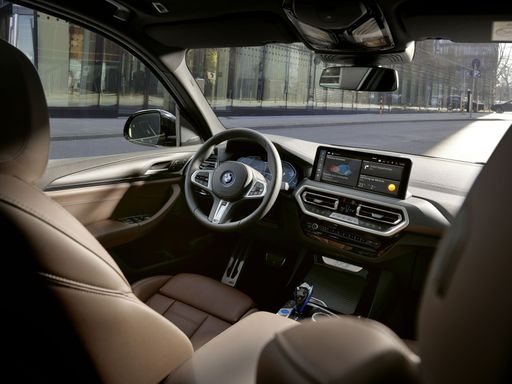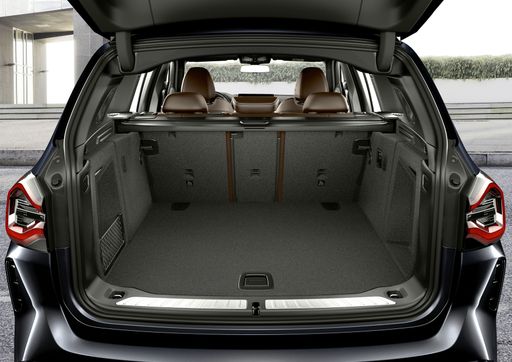BMW iX3 vs VW Tiguan - Differences and prices compared
Compare performance (469 HP vs 272 HP), boot space and price (59100 £ vs 33300 £) at a glance. Find out which car is the better choice for you – BMW iX3 or VW Tiguan?
Costs and Efficiency:
Price and efficiency are key factors when choosing a car – and this is often where the real differences emerge.
VW Tiguan has a decisively advantage in terms of price – it starts at 33300 £, while the BMW iX3 costs 59100 £. That’s a price difference of around 25757 £.
As for range, the BMW iX3 performs clearly better – achieving up to 805 km, about 679 km more than the VW Tiguan.
Engine and Performance:
Power, torque and acceleration are the classic benchmarks for car enthusiasts – and here, some clear differences start to show.
When it comes to engine power, the BMW iX3 has a clearly edge – offering 469 HP compared to 272 HP. That’s roughly 197 HP more horsepower.
In acceleration from 0 to 100 km/h, the BMW iX3 is clearly perceptible quicker – completing the sprint in 4.90 s, while the VW Tiguan takes 5.90 s. That’s about 1 s faster.
In terms of top speed, the VW Tiguan performs to a small extent better – reaching 242 km/h, while the BMW iX3 tops out at 210 km/h. The difference is around 32 km/h.
There’s also a difference in torque: BMW iX3 pulls noticeable stronger with 645 Nm compared to 400 Nm. That’s about 245 Nm difference.
Space and Everyday Use:
Beyond pure performance, interior space and usability matter most in daily life. This is where you see which car is more practical and versatile.
Both vehicles offer seating for 5 people.
In curb weight, VW Tiguan is clearly lighter – 1599 kg compared to 2360 kg. The difference is around 761 kg.
In terms of boot space, the VW Tiguan offers noticeable more room – 652 L compared to 520 L. That’s a difference of about 132 L.
In maximum load capacity, the BMW iX3 performs slight better – up to 1750 L, which is about 100 L more than the VW Tiguan.
When it comes to payload, VW Tiguan slightly takes the win – 533 kg compared to 465 kg. That’s a difference of about 68 kg.
Who wins the race?
The BMW iX3 proves to be is largely superior and therefore becomes our DriveDuel Champion!
BMW iX3 is the better all-rounder in this comparison.

BMW iX3
Costs and Consumption
View detailed analysis
Engine and Performance
View detailed analysis
Dimensions and Body
View detailed analysis
BMW iX3
The BMW iX3 brings BMW's familiar SUV poise into the electric era, blending restrained styling and a comfortable, composed ride that will please traditionalists dipping their toes into electrification. It's quiet, practical and rather grown-up about going electric — a sensible choice for buyers who want BMW driving manners without the drama.
details



VW Tiguan
The VW Tiguan blends sensible family practicality with a dash of German polish, delivering a calm, reassuring ride and a cabin that never feels like an afterthought. For buyers who want an SUV that’s easy to live with yet still nicely dressed, the Tiguan is the grown‑up choice that keeps a cheeky wink in reserve.
details






|

|
|
|
|
Costs and Consumption |
|
|---|---|
|
Price
59100 - 64600 £
|
Price
33300 - 51900 £
|
|
Consumption L/100km
-
|
Consumption L/100km
1.4 - 8.4 L
|
|
Consumption kWh/100km
15.10 kWh
|
Consumption kWh/100km
-
|
|
Electric Range
805 km
|
Electric Range
118 - 126 km
|
|
Battery Capacity
108.70 kWh
|
Battery Capacity
19.70 kWh
|
|
co2
0 g/km
|
co2
32 - 190 g/km
|
|
Fuel tank capacity
-
|
Fuel tank capacity
45 - 58 L
|
Dimensions and Body |
|
|---|---|
|
Body Type
SUV
|
Body Type
SUV
|
|
Seats
5
|
Seats
5
|
|
Doors
5
|
Doors
5
|
|
Curb weight
2360 kg
|
Curb weight
1599 - 1890 kg
|
|
Trunk capacity
520 L
|
Trunk capacity
490 - 652 L
|
|
Length
4782 mm
|
Length
4539 mm
|
|
Width
1895 mm
|
Width
1842 - 1859 mm
|
|
Height
1635 mm
|
Height
1656 - 1658 mm
|
|
Max trunk capacity
1750 L
|
Max trunk capacity
1486 - 1650 L
|
|
Payload
465 kg
|
Payload
460 - 533 kg
|
Engine and Performance |
|
|---|---|
|
Engine Type
Electric
|
Engine Type
Petrol, Petrol MHEV, Diesel, Plugin Hybrid
|
|
Transmission
Automatic
|
Transmission
Automatic
|
|
Transmission Detail
Reduction Gearbox
|
Transmission Detail
Dual-Clutch Automatic
|
|
Drive Type
All-Wheel Drive
|
Drive Type
All-Wheel Drive, Front-Wheel Drive
|
|
Power HP
469 HP
|
Power HP
130 - 272 HP
|
|
Acceleration 0-100km/h
4.90 s
|
Acceleration 0-100km/h
5.9 - 10.6 s
|
|
Max Speed
210 km/h
|
Max Speed
210 - 242 km/h
|
|
Torque
645 Nm
|
Torque
220 - 400 Nm
|
|
Number of Cylinders
-
|
Number of Cylinders
4
|
|
Power kW
345 kW
|
Power kW
96 - 200 kW
|
|
Engine capacity
-
|
Engine capacity
1498 - 1984 cm3
|
General |
|
|---|---|
|
Model Year
2026
|
Model Year
2024 - 2025
|
|
CO2 Efficiency Class
A
|
CO2 Efficiency Class
G, D, E, F, B
|
|
Brand
BMW
|
Brand
VW
|
What drive types are available for the BMW iX3?
The BMW iX3 is available as All-Wheel Drive.
The prices and data displayed are estimates based on German list prices and may vary by country. This information is not legally binding.




